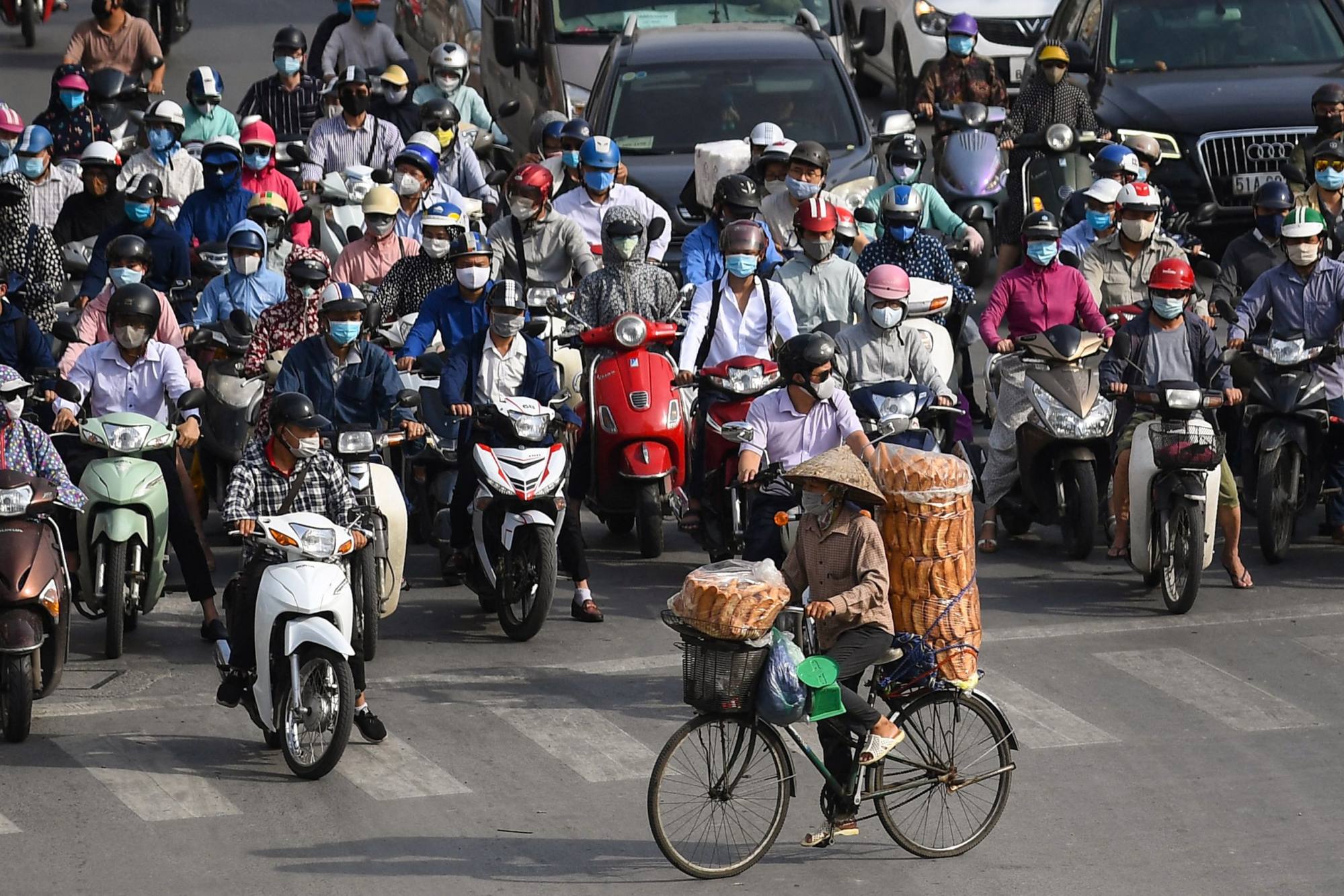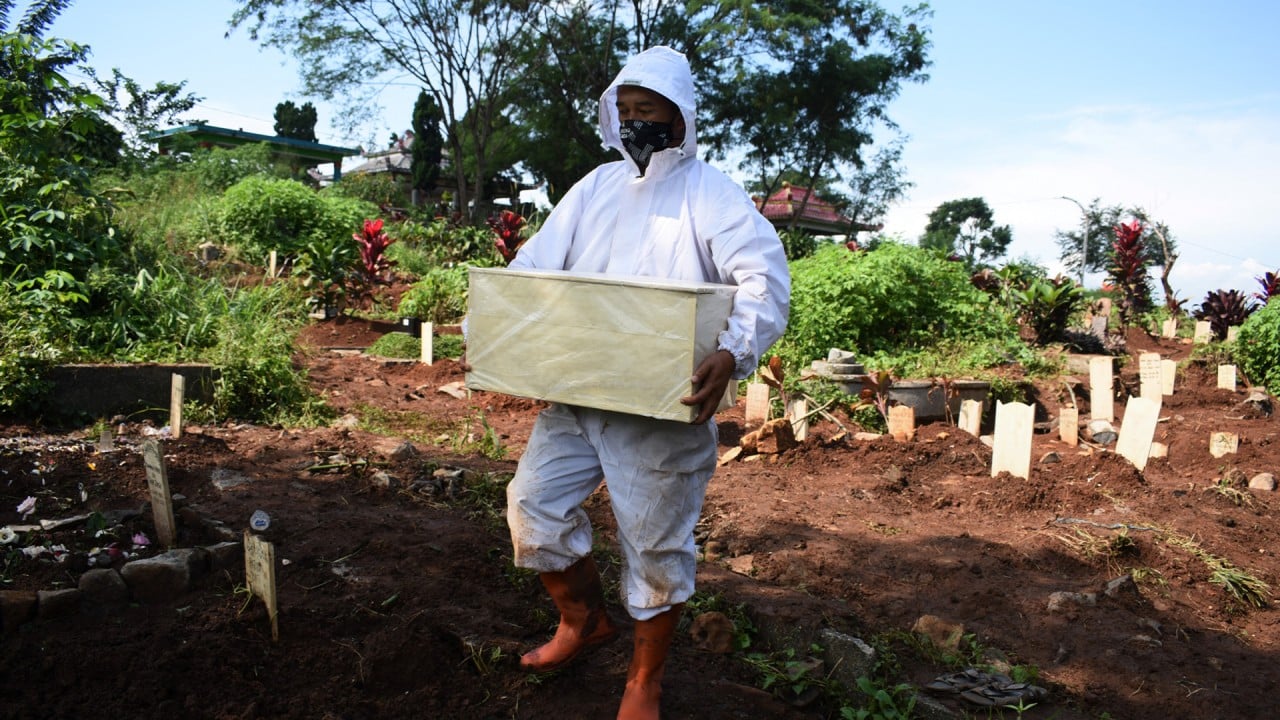
As Delta variant sweeps the West, Asia faces a choice: stick to ‘zero-Covid’ approach or learn to live with it
- The highly transmissible variant first identified in India has put a question mark over Europe’s summer and is starting to breach the defences of previously well-protected nations like Vietnam
- While nations like Australia and Indonesia have responded with tighter restrictions, others such as Singapore suggest now is the time to ‘get on with our lives’
In Europe and North America, the rapid spread of the highly transmissible variant first identified in India has placed a question mark over hopes for a normal summer, even as climbing vaccination rates spur the rolling back of restrictions and resumption of tourism and travel.
In the Asia-Pacific region, the variant is fuelling outbreaks in countries that have struggled to manage the virus, while reinforcing the hyper-cautious stance of “zero-Covid” economies reliant on strict border controls, which have prevented countless deaths but have also come under mounting criticism as other parts of the world look towards post-pandemic life.
The Delta variant, now circulating in at least 80 countries, is believed to be 60 per cent more transmissible than the Alpha variant first identified in Britain, which itself is about 50 per cent more infectious than the strain first identified in Wuhan, China. Delta also appears more resistant to vaccines than other strains, although fully vaccinated people continue to be well protected from serious disease and death.
In Britain, where authorities have delayed the country’s full reopening to July 19 amid a more than six-fold surge in infections since late May, the variant now accounts for about 99 per cent of new coronavirus cases. The European Centre for Disease Prevention and Control said on Wednesday it expected the variant to account for over 90 per cent of new Covid-19 cases in Europe by the end of August. German Chancellor Angela Merkel, who has called for all EU member states to quarantine arrivals from Britain, on Thursday warned the continent was “on thin ice” due to the variant’s rapid spread.
In Singapore, where more than half the country’s 5.7 million people have received one dose of vaccine, one of the region’s highest vaccination rates, health authorities have blamed a moderate uptick in cases in recent weeks on the Delta strain, which accounted for 550 local and imported cases as of late May. Hong Kong health authorities on Wednesday locked down a residential block after an airport worker was identified as the city’s first likely case of the variant.
In Australia, authorities in the state of New South Wales recently announced restrictions including stay-at-home orders and capacity limits for venues following the emergence of a cluster of cases linked to the variant.
“From an immunity perspective, locations in the Asia-Pacific region that have thus far been successful at keeping cases of Covid low are not much better off than we were a year ago,” said Karen A. Grépin, an associate professor at Hong Kong University’s Li Ka Shing Faculty of Medicine. “So if these places were to see widespread community transmission of the virus, we will also see large numbers of hospitalisations and deaths. This is a particular challenge here in Hong Kong where the most vulnerable – those over the age of 70 and 80 – have among the lowest vaccination rates of any age group.”
‘Zero-Covid’ economies face tough question: how many deaths are acceptable?
Although the Delta variant is highly transmissible, questions remain about the threat it poses, which appears largely confined to the unvaccinated, and the extent to which it should give pause to authorities eager to jump-start their pandemic-battered economies, especially as vaccinations pick up pace.
In Britain, where more than 80 per cent of the population has received at least one dose of vaccine, death rates have remained nearly flat despite cases surging past 15,000 infections each day – although medical experts have cautioned that hospitalisations and deaths typically lag cases by several weeks.

The Pfizer and Oxford-AstraZeneca vaccines are, respectively, 96 per cent and 92 per cent effective against hospitalisation from the variant after the second dose, according to a Public Health England analysis released in June, although efficacy drops considerably with just one dose.
France, Germany, Spain, Italy and Greece have all eased travel or social distancing restrictions in recent days, following the European Union’s recommendation that countries open their borders to vaccinated travellers.
Jeremy Rossman, a honorary senior lecturer in virology at the University of Kent, warned that although Britain’s high vaccination rate would “blunt” fatalities, the variant’s rapid spread could dash Europe’s hopes for a celebratory summer.
“It is very likely that the Delta variant will hinder Europe’s reopening, as cases are already beginning to rise,” Rossman said. “The stronger approach used by several countries in Asia and the Pacific have enabled far greater protection of both health and the economy of these countries. We are all wanting to return to normal, but the pandemic is still on-going and continued actions are needed to continue to protect the population’s health and wealth.”

In the Asia-Pacific region, where vaccination rates remain sluggish, authorities in low-Covid jurisdictions have been cautious about unwinding their strict border controls.
On Monday, Hong Kong authorities announced that they would ease hotel quarantine to seven days for most vaccinated travellers, although government adviser David Hui Shu-cheong warned the arrangements were likely to change if cases entered the community. In Australia, the government has indicated borders are unlikely to reopen before mid-2022 at the earliest. New Zealand, which sealed its borders in March 2020 and has fully vaccinated less than 10 per cent of its population, has not laid out any timetable for reopening to the world.
“The emergence of the Delta variant is definitely reason to be cautious especially in countries where vaccination rates are still relatively low,” said Michael Plank, a statistician at the University of Canterbury whose modelling informed the New Zealand government’s pandemic response. “So the key to not being left behind is getting as many people vaccinated as possible.”
Herd immunity stalemate faces Asia’s ‘zero-Covid’ economies
Thira Woratanarat, an epidemiologist at Chulalongkorn University in Bangkok, expected the Delta variant to be the dominant strain in Asia before the end of the year. He said reopening should depend on a combination of high vaccination rates, effective pandemic control, and health-care and testing capacity.
“Opening the country for international trade and tourism is necessary for most of the countries in the world,” Woratanarat said. “However, we can learn from some successful countries that there should be three components to be achieved before opening.”
Although credited with keeping the virus at bay, border closures across the Asia-Pacific have inflicted a heavy economic and social toll, with industries such as tourism decimated and families separated for months on end.
In May, the Sydney-based McKell Institute estimated Australia’s border closures cost the country A$203 million (US$157 million) every day in lost economic activity. In Hong Kong, GDP fell for a record six consecutive quarters in 2019 and 2020 – a period that overlapped with mass protests and civil unrest – before finally rebounding to positive growth in the first quarter of this year. Hong Kong General Chamber of Commerce CEO George Leung Siu-kay warned recently that the city’s economic recovery would remain stalled as long as the borders stay closed. In a survey of economists published by Bloomberg on Friday, most of the Asia-Pacific’s major economies were not expected to return to pre-pandemic levels of growth before 2023, with tourism seen as a key variable in kickstarting the region’s recovery.
Donald Low, a professor of public policy at Hong Kong University of Science and Technology, said the emergence of variants showed that societies needed to learn to live with the virus.
“The fact that there are more transmissible variants is, in fact, evidence that Covid will become endemic, that it will not be eliminated, and that we should all get vaccinated so that we can transit to a post-pandemic normal,” Low said. “That there are more transmissible variants is not an argument for more suppression. From a cost-benefit perspective, more transmissible variants also mean that achieving a given level of viral suppression – say zero-Covid – would cost society a lot more.”
Low said it was time for authorities to start “thinking about transiting from strict containment to mitigation”.
“There’s a general consensus among scientists that Covid-19 will become endemic, so a suppression approach – which was necessary in the initial phase of the pandemic – is not tenable for much longer,” he said.

In a sign of growing awareness that societies will have to learn to live with Covid-19, a group of Singaporean government ministers wrote in The Straits Times on Thursday that the government was working on a blueprint to allow the country to “live normally with it in our midst”.
The ministers, Gan Kim Yong, Ong Ye Kung and Lawrence Wong, said the plans could include multi-year vaccine booster shots and a shift away from daily case updates to turn the pandemic “into something much less threatening like influenza” and allow the “battle weary” population to “get on with our lives”.
“I believe we will have to adapt to and learn to live with Delta and future variants of Covid-19,” said Hsu Li Yang, an infectious diseases expert at the National University of Singapore. “The question of percentage of population vaccine coverage necessary to prevent hospitals and health systems from being overwhelmed is uncertain at present, but we are likely to learn from events over the next half year in the UK, US and other countries where the Delta variant has taken root.”
Is the zero-Covid approach of China and Japan about saving face?
Gigi Foster, a professor of economics at the University of New South Wales, said a disproportionate focus on variants was adding “fuel to the fear machine” and societies needed to break out of their “religious fervour” around Covid-19 to get back to normal life.
“We should be demanding of our politicians a specific and imminent end date to the international border closures, policy stability instead of stop-start domestic lockdowns, and commitment to a new, unifying message that we need to learn to live with Covid while minimising the human costs of doing so,” Foster said.
“The longer we allow the madness to continue, the further behind Australia will fall, as other countries wake up to the realisation that this was all a catastrophic mistake.”



